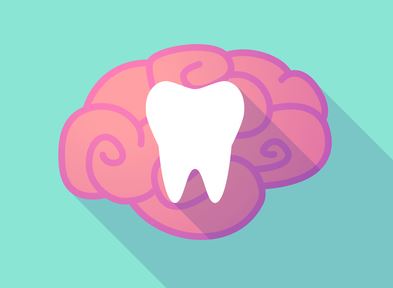
Do you know there’s an oral health and mental health link? When you’re brushing your teeth every night before bed, you’re probably not thinking about how your oral health can affect your overall wellbeing and mental health. It seems like a big leap to take when understanding your teeth have anything to do with your mental health, but studies show that the oral and mental health link is real.
“Mental health impacts your overall health, including your oral health or the health of your teeth and your gums. Dentists are sometimes the first professional to identify and diagnose a mental health issue and they make a lot of referrals to counselors and therapists,” says Susan Albers, PsyD, psychologist for Cleveland Clinic.
Related Article: A Deep Dive into the Connections Between Oral and Behavioral Health
If your daily life is stressing you out … you could be clenching or grinding your teeth without even knowing. This can cause tooth and jaw pain, facial pain, and dental wear & damage. If you’re busy and struggling to juggle your schedule, you may be missing your morning and/or evening tooth brushing and flossing routine. When our mental health is struggling, how well we take care of ourselves can certainly be a struggle as well.
Here are some examples of the oral and mental health link:
Over time, neglecting our oral health can lead to issues such as:
Related Articles:
“A strong interaction exists between oral health and mental health. People with mental illness, particularly severe mental illness, are at greater risk of oral health problems because of poor nutrition and oral hygiene; the heavy consumption of sugary drinks; comorbid substance misuse including tobacco, alcohol, or psychostimulants; and financial or other barriers to accessing dental care,” according to Steve Kisley, MD, PhD.
Read more of Kisley’s study HERE.
You may think about stress being a factor behind many health problems, but now that we know the truth is, stress can also have a negative effect on your oral health as well due to the oral and mental health link.
There are six main ways that stress can affect your oral health, including:
Each of these issues are examples of oral and mental health link that can be a result from too much stress in your life. However, there are steps you can take to keep your mouth healthy, so you don’t have stressed out oral health!
Related Article: Mental Health Awareness Month: Link Between Oral Health and Mental Health
To help our oral health and in turn, our mental health, here are a few tips!
Related Article from WebMD: How Does Your Oral Health Affect Your Mental Health?
Dr. Roberts can help prevent fractured and cracked teeth by designing an oral appliance or mouthguard to wear at night to keep you from grinding and clenching your teeth. We know there’s a dental health and mental health link and thankfully, mouthguards are a simple and affordable way to protect your teeth at night. They can also help with sleep apnea and snoring. Each mouthguard will be custom-made by Dr. Roberts to fit your mouth comfortably and will keep your jaws separated so they don’t grind together.
There’s more good news: Custom mouthguards or oral appliance therapy is covered by many insurance plans and the team at Adams Dental Group can help answer any questions you may have about your coverage.
Related Articles:
As you know, the oral and mental health link is so important; however, when your body is stressed, it can lead to having stressed out oral health! A solid foundation that includes daily brushing and flossing is key for you and your family. Dr. Roberts and his Team can help you maintain or improve your oral health, because they can assess your situation and customize a treatment plan at whatever stage you find yourself.
It’s also important to stay up to date on your dental exams, cleanings and routine visits. In the meantime, having a consistent and steady oral health routine – brushing twice a day and flossing once – is the best thing you can do for your oral health! Remember to schedule your dental exam and cleaning at Adams Dental Group in Kansas City, KS. We look forward to seeing you at your next dental appointment.
Local dentist, Travis A. Roberts and his experienced, friendly team at Adams Dental Group offer affordable family dentistry and gentle dental care in the Kansas City, KS area. We have two locations that are conveniently located and offer appointment times Monday through Friday to meet your needs. At Adams Dental Group, we provide most dental services, from family and general dentistry to restorative procedures, including dental implants, dentures, endodontic or root canal treatment, teeth whitening, cosmetic dentistry and much more. We accept most dental insurance plans and offer affordable financial solutions for any budget. Call us at (913) 296-8030 to schedule an appointment.
Dr. Travis A. Roberts, DDS July 26th, 2022
Posted In: Dental Health Tips
Tags: brush and floss, custom mouthguards, dental health, oral health